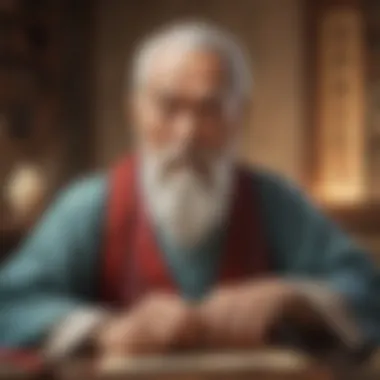Lao Tzu's Wisdom in The Art of War: A Deep Dive


Intro
In a world often filled with chaos and conflict, the teachings of ancient philosophers hold a unique significance. Two such minds, Lao Tzu and Sun Tzu, offer profound insights that resonate still today. Lao Tzu, the sage behind Tao Te Ching, emphasizes harmony, humility, and the natural order of things. Meanwhile, the strategist Sun Tzu, author of The Art of War, presents approaches to conflict that are as philosophical as they are tactical. By examining their ideas side by side, one can uncover a remarkable synthesis of wisdom that applies not just to battlefield strategies but also to leadership and personal growth.
Understanding how Lao Tzu's philosophies intertwine with Sun Tzu's military principles presents an opportunity for a deeper exploration of both texts and their relevance in modern times. This exploration will reveal how these teachings guide individuals in facing conflicts, be it internally, in their organizations, or in the broader society.
Next, we will delv deeper into the key themes explored in their works.
Prelude to Lao Tzu and 'The Art of War'
A study of Lao Tzu’s philosophies alongside the strategic insights of 'The Art of War' provides a unique lens through which to examine the nature of conflict, leadership, and personal growth. This exploration is not just an academic exercise; it reveals essential truths that hold significance even in our contemporary world. Both Lao Tzu and Sun Tzu offer frameworks that transcend time and culture, inviting us to reevaluate our approach to power dynamics and decision-making in various facets of life.
By bringing these texts together, we can gain a deeper understanding of how ancient wisdom can inform modern practices. Their principles serve as a reminder that reflection and strategy are intertwined—combining the serene insights of Taoism with the tactical acumen of military theory. Uncovering these connections enhances our ability to navigate conflict with grace and effectiveness, whether in a boardroom or within personal relationships.
Historical Context of Lao Tzu
Lao Tzu, a central figure in Chinese philosophy, is often credited with founding Taoism. His thoughts, articulated in the Tao Te Ching, emphasize harmony, balance, and the intrinsic value of nature. Luo Tzu's era, likely around the 6th century BCE, was marked by significant social upheaval—feudal wars and profound philosophical inquiry characterized this time.
A notable aspect of Lao Tzu's philosophy is the concept of "wu wei," or effortless action, which suggests that one can achieve goals by aligning with the natural flow of life instead of resisting it. This differentiation enhances our understanding of conflict, as it teaches the importance of timing and strategy over brute strength. Lao Tzu's insights into human nature and governance serve as a backdrop for interpreting the strategic lessons found in Sun Tzu's writings.
Overview of 'The Art of War'
The Art of War is a seminal text on military strategy authored by Sun Tzu, a contemporary of Lao Tzu, around the same period in ancient China. This work isn't merely a tactical guide; its principles can be applied to various conflicts, whether in warfare, business, or interpersonal relations. Sun Tzu emphasizes the importance of understanding both oneself and one’s adversary, thereby promoting a strategy of preparation and knowledge.
A paramount tenet in The Art of War is the adage that “All warfare is based on deception.” This idea aligns intriguingly with Lao Tzu’s teachings, as it suggests that adaptability and intelligence can serve individuals far better than sheer force. The text is structured around several key themes including demographic awareness, environmental considerations, and the psychological aspects of warfare, pushing readers to think deeply about how they approach conflicts in their lives.
"Know your enemy and know yourself and you can fight a hundred battles without disaster."
— Sun Tzu
In sum, the dialogue between Lao Tzu's philosophical insights and Sun Tzu's strategic methodologies offers fertile ground for deeper understanding—both of ancient texts and their timeless wisdom in modern contexts. This article will further delve into these teachings and uncover valuable lessons from both thinkers.
Philosophical Foundations
The philosophical underpinnings of Lao Tzu’s thought and Sun Tzu’s military strategy provide a rich tapestry that informs our understanding of conflict and resolution. This section delves into the fundamental principles of Taoism and explores the core concepts presented in "The Art of War." Together, these ideas form a coherent guide for navigating both internal and external challenges, ultimately enriching the discourse on leadership and personal development.
Principles of Taoism
At its core, Taoism emphasizes harmony with the Tao, seen as the ultimate source of everything and the natural order of the universe. Lao Tzu, through his poetic writings, articulates a worldview driven by balance, humility, and acceptance of life’s inherent flow. This pursuit of harmony is not merely philosophical but offers practical wisdom that translates to decision-making and conflict resolution.
One important element is the notion of wu wei, or "effortless action." This principle encourages individuals to align their actions with the natural rhythm of life rather than forcing situations to unfold in a predetermined manner. By advocating for a mindset of receptiveness and adaptive response, Lao Tzu lays down a framework for effective leadership. In leadership roles, understanding when to push forward or let things be can make a significant difference in outcome, fostering a sense of community and cooperation among team members.
Core Concepts in 'The Art of War'
Sun Tzu’s "The Art of War" remains one of the most influential texts on strategy. Its concepts, while initially developed for the battlefield, have found applications across various aspects of life including business and personal development. Sun Tzu lays out a series of core concepts that hinge on strategic awareness and thoughtful execution.
Strategic Planning
Strategic planning in "The Art of War" refers to the meticulous preparation that precedes action. Sun Tzu underscores that careful forethought can lead to victories, often without actual conflict. The major characteristic of this approach is the emphasis on thorough investigation and analysis of the situation at hand, ensuring that decisions are based on clear insight rather than mere impulse. This way of planning is notably beneficial for those looking to navigate modern challenges, offering a structured lens through which to assess situations.
Unique to this concept is the idea of flexibility—strategic plans must evolve as circumstances change. This adaptability is advantageous because it allows leaders to pivot if initial strategies do not yield the expected results. Nevertheless, the drawback is that over-planning can sometimes lead to stagnation, as excessive deliberation may hinder timely action.
Know Your Enemy
The directive to know your enemy emphasizes the importance of understanding not just oneself but the opposition as well. Sun Tzu asserts that awareness of the enemy’s strengths, weaknesses, and tactics arms the strategist with leverage. This aspect is crucial as it promotes a realistic assessment of one’s own capabilities in light of external challenges.
The main characteristic here is the thorough research and reconnaissance undertaken to gain the upper hand. This approach can be seen as pivotal in many arenas, including business negotiations or competitive environments. Its unique feature is that it fosters a mindset of continuous learning, urging individuals to keep adapting their strategies as they gain more information. The flip side could be a tendency towards paranoia or over-cautious behavior, which might inhibit bold decision-making.


The Value of Deception
Sun Tzu’s assertion that all warfare is based on deception points towards a critical psychological dimension of conflict. Deception serves as a strategy that can mislead opponents and create opportunities, whether in negotiation, competition, or during actual warfare. The key characteristic here is the element of surprise, often making the difference between defeat and victory.
A unique aspect of this concept is the ethical dilemma it presents. While deception can lead to victory, it also risk damaging trust and relationships in the long term. This presents a double-edged sword, where one must weigh the potential success against the possible repercussions of deceit in personal or professional networks.
"In the midst of chaos, there is also opportunity."
In summary, the philosophical foundations laid out by Lao Tzu and Sun Tzu reveal essential approaches to conflict, leadership, and personal growth. These ancient teachings, although deeply rooted in their own times, continue to resonate well into contemporary society, proving invaluable for anyone navigating the complexities of modern life.
Parallels Between Lao Tzu and Sun Tzu
The teachings of Lao Tzu and Sun Tzu often stand at opposing ends of a philosophical spectrum. However, upon deeper examination, one finds their insights surprisingly complementary. Both thinkers address the human condition, conflict, and strategy, albeit from different angles. This relationship between their ideas helps us understand how their teachings can be applied to contemporary issues, from personal conflicts to large-scale leadership challenges.
Approach to Conflict Resolution
At the heart of both philosophies lies a nuanced approach to conflict resolution. Lao Tzu’s perspective, rooted in Taoist philosophy, suggests a more subdued and holistic way of dealing with challenges. He advocates for clarity, patience, and the acknowledgment of the natural flow of events. Often, he emphasizes the importance of non-action, or Wu Wei, suggesting that sometimes the best action is inaction, allowing situations to unfold on their own.
Conversely, Sun Tzu presents a more tactical approach in The Art of War. His strategies encourage proactive engagement and intelligence gathering. He advocates for knowing one’s enemy as well as oneself, which allows for decisive action when necessary. The essence of his teachings revolves around being prepared for conflict, but also knowing when to engage and when to retreat.
Understanding these differing approaches can lead to profound insights in today’s conflict resolution strategies. For instance, in a business environment, one may employ Lao Tzu’s emphasis on patience when analyzing a potential merger, assessing the flow of the corporate landscape before taking action. On the other hand, when a competitor launches an aggressive campaign, Sun Tzu’s advice—gather intelligence and act decisively—comes into play.
Balance and Harmony
When it comes to balance and harmony, Lao Tzu’s teachings resonate strongly with the principles of yin and yang. He suggests that true harmony is achieved through understanding the opposite forces at work in any conflict or situation. This balance is not merely a philosophical concept but a practical guide for personal and communal conflict resolution.
Sun Tzu also acknowledges balance, particularly in terms of strength and weakness. His strategies revolve around creating advantageous conditions for oneself while exposing vulnerabilities in the opponent. His famous line, "All warfare is based on deception," encapsulates how manipulation of strengths can lead to harmony in the battlefield—where one has control over the unfolding events.
The interplay of the two philosophies invites us to consider harmony as a dynamic, rather than static, state. For example, in personal development, one might strive to embrace both Lao Tzu's serenity and Sun Tzu's decisiveness. By nurturing a harmonious mindset shaped by responsiveness rather than reaction, individuals can navigate conflicts more adeptly.
In summary, while Lao Tzu and Sun Tzu come from different schools of thought, their teachings provide valuable insights into conflict resolution and balance. As we apply these paradigms, it becomes clear how the wisdom of both can enrich our understanding and approach to challenges we face in the modern world. This allows us to engage with conflicts not just as a battlefield but as an opportunity for growth and adaptability.
The Role of Leadership
In a landscape often marked by chaos and uncertainty, the role of leadership takes center stage. Both Lao Tzu's teachings and Sun Tzu's military wisdom emphasize that effective leadership is not just about directing troops or managing a team. It's about cultivating an environment where individuals grow and thrive, fostering unity and purpose melded with clarity of vision. The importance of leadership in Lao Tzu's and Sun Tzu’s philosophies cannot be overstated, as both stress a leader's responsibility to inspire trust, wisdom, and adaptability.
"A leader is best when people barely know he exists, when his work is done, his aim fulfilled, they will say: we did it ourselves."
- Lao Tzu
Through their insights, we grasp that a significant aspect of leadership is the ability to adapt to changing circumstances, much like a seasoned tree bending in wind but rooted deeply in the ground. These leaders walk a fine line between strength and flexibility, guiding their followers through various challenges while still allowing autonomy in decision-making.
Lao Tzu's Perspective on Leadership
Lao Tzu gives priority to the inner qualities that define good leadership. He believes that the essence of a great leader stems from humility and wisdom. In contrasting situations, he suggests that dictating orders might often lead to resistance, whereas a leader who embodies the Tao invites cooperation and collaboration. Essentially, leaders should aim to align themselves with the natural flow of life.
In his philosophy, leaders are expected to foster an atmosphere where every individual’s potential is understood and nurtured. Lao Tzu promotes virtues such as patience and self-restraint, believing that the best leaders manage without overreaching. Instead of micromanaging, they guide their teams by understanding diverse perspectives, actively listening, and creating a platform for collective dialogue. This empowers individuals, making them feel valued, and in turn, strengthens the overall cohesion of the group.
Leadership Lessons from 'The Art of War'
The principles strewn across Sun Tzu's 'The Art of War' deliver timeless leadership lessons that extend well beyond the battlefield. One primary lesson echoes through the ages: knowledge is power. Understanding one's own strengths, weaknesses, and those of the adversary is paramount in crafting a strategic approach to leadership. Specifically, Sun Tzu advises leaders to engage in thorough analysis before making decisions, ensuring they remain a few steps ahead.
Furthermore, effective communication resonates as a vital thread through Sun Tzu's strategies. Leaders must establish clear lines of communication not only to relay orders but also to gather feedback. This two-way street creates a culture of mutual respect and understanding.
Incorporating strategic lessons, such as the value of deception, is another critical point. Leaders may not need to reveal their full intentions or capabilities upfront. Sometimes, presenting oneself in an unexpected manner may help to stabilize the team or confound competitors.
To summarize, both Lao Tzu and Sun Tzu illuminate the path of leadership through their philosophies, stressing qualities like adaptability, wisdom, and empathy as the cornerstones of effective guidance. Their teachings encourage individuals in positions of authority to dig deep, reflect internally, and navigate their paths with integrity and insight.


Application in Modern Context
The philosophical principles established by Lao Tzu and the strategic insights found in 'The Art of War' hold a wealth of knowledge that can be remarkably relevant in today's fast-paced world. Whether in the boardroom, a personal challenge, or even the broader socio-political landscape, understanding these principles provides critical tools for effective decision-making and conflict resolution.
In modernity, where competition is relentless, drawing from ancient wisdom enables individuals and organizations to navigate complex environments. Often, the situations we encounter require more than mere tactical solutions; they demand deeper understanding and adaptability. When we look at Lao Tzu’s emphasis on harmony and balance, along with Sun Tzu’s strategic foresight, we uncover valuable insights that foster sustainable success in various contexts.
Conflict Management in Business
Conflict in the business realm is almost inevitable, given the diverse array of personalities, objectives, and priorities at play. With principles derived from both Lao Tzu and 'The Art of War', businesses can adopt more nuanced approaches to conflicts.
- Understanding Opponents: Sun Tzu famously stated, "Know your enemy and know yourself and you can fight a hundred battles without disaster." This is pivotal in negotiations. Businesses are often thrust into competitive scenarios where the key to winning isn't just about the product but understanding competitors' strengths and weaknesses.
- Avoidance of Direct Confrontation: Lao Tzu suggested that sometimes the best way to deal with a conflict is to sidestep it entirely. This doesn’t mean avoiding issues; instead, it encourages finding alternative solutions that do not escalate tensions. For instance, creating win-win solutions can mitigate conflict without diminishing anyone's stakes.
- Flexibility in Strategies: The modern business environment is dynamic. Lao Tzu advocated for flexibility, which in practice can translate to adaptive leadership. On-the-ground leaders who can pivot strategies based on real-time data and team dynamics often outperform rigid tactics.
- Emphasis on Collaboration: Both thinkers place great importance on collaboration. Lao Tzu’s teachings encourage leaders to cultivate a sense of community within teams, while Sun Tzu’s strategies highlight the strength found in alliances. Embracing these concepts allows businesses to not only succeed in conflict resolution but thrive on the collective strengths of their teams and partnerships.
Personal Development Strategies
The teachings of Lao Tzu and Sun Tzu also lend themselves to personal growth. In a world that often prioritizes hustle culture, the philosophies encourage a different path towards self-improvement that can resonate with many.
- Self-Reflection: At the core of both philosophies is the idea of self-awareness. Understanding one’s own strengths and weaknesses is crucial. Personal growth starts with one's ability to look inward. Make it a habit to assess how your talents can align with your goals, similar to assessing the battlefield.
- Embracing Change: Change is the only constant. Lao Tzu emphasizes flowing with the ebbs and tides of life rather than resisting them. This can apply to personal adaptations, such as altering goals or methods in response to feedback or unforeseen circumstances.
- Resilience: Sun Tzu teaches a sort of strategic patience. Recognizing that setbacks are a part of growth helps to embrace failures rather than fear them. Instead of viewing conflicts as negative, see them as opportunities to learn and grow stronger.
- Strategic Vision: Having a clear vision for personal goals, much like a strategist preparing for a battle, is essential. Drafting a roadmap for where you want to be—not just professionally, but personally—will keep you aligned with your values and inspire continual progress.
Ultimately, both Lao Tzu and Sun Tzu offer frameworks for navigating challenges. Their ancient wisdom continues to be applicable in modern life, encouraging a comprehensive approach to conflict management and personal development that prioritizes flexibility, understanding, and growth.
Insights on Strategy and Tactics
Understanding strategy and tactics is like peeling an onion; each layer brings new insights that are both interconnected and critical in nature. This section sheds light on how both Lao Tzu’s philosophical teachings and Sun Tzu’s military frameworks provide a comprehensive understanding of strategic thought and tactical application in various spheres of life. Insights gathered from these ancient texts offer not just wisdom for war but also invaluable approaches for conflict resolution, leadership, and personal growth.
Strategic Thinking from Lao Tzu’s Teachings
Lao Tzu’s thoughts on strategy transcend mere battlefield tactics; they encompass the essence of human interaction and nature’s rhythm. His teachings emphasize balance, yielding, and the significance of understanding oneself and others. Here, strategic thinking is not just about winning but about creating harmony. Lao Tzu teaches us to approach challenges with calm and steady awareness. For instance, he famously stated, "A journey of a thousand miles begins with a single step." This highlights the importance of recognizing where to start and the necessity of small, deliberate actions that pave the way for larger accomplishments.
Moreover, Lao Tzu stresses the importance of adaptability. He encourages individuals to be like water, flowing and adjusting to the contours of the landscape. In practical terms, this means assessing situations with an open mind and allowing flexibility to guide decisions. Some essential elements of Lao Tzu’s strategic thinking include:
- Self-awareness: Knowing one's strengths and weaknesses.
- Observation: Carefully understanding the context and environment.
- Patience: Allowing time to take its course without forceful interference.
These concepts lead to a profound understanding of how to navigate complex interactions beyond mere strategies.
Tactical Applications from 'The Art of War'
Similarly, Sun Tzu’s 'The Art of War' delves into the realm of tactics with a keen eye on the nuances of competition and conflict. His famous axiom, “Know your enemy and know yourself and you can fight a hundred battles without disaster,” serves as a cornerstone for tactical wisdom. This highlights the necessity of preparation and intelligence gathering, which is as relevant in business negotiations as it is in military operations.
Sun Tzu elucidates several tactical applications which can be directly employed in various scenarios:
- Deception: Luring opponents into a false sense of security or misleading them is a frequent tactic.
- Speed: Quick decision-making can outpace slower competitors, seizing opportunities that others may miss.
- Know the Terrain: Understanding the environment—whether it’s the market landscape in business or the battlefield—is crucial for tactical advantage.
"In the midst of chaos, there is also opportunity." – Sun Tzu
This quote encapsulates the tactical mindset of seizing opportunities even in uncertain conditions.
The Importance of Adaptability
Adaptability is a fundamental theme that runs through the philosophies of Lao Tzu and Sun Tzu, finding its way into the heart of their teachings. In a world where change is the only constant, being adaptable is not merely advantageous but essential for survival, success, and the ability to navigate through life's complexities.
Lao Tzu's Taoism promotes the idea of flowing like water, emphasizing the natural course of life while adjusting to its various ebbs and flows. This idea translates beautifully into strategic thinking, particularly in situations where rigidity can lead to downfall. Thus, the principle of adaptability in both the Tao Te Ching and The Art of War helps individuals and leaders alike to not just endure challenges but to thrive amidst them.
Some specific benefits of fostering adaptability include:
- Quick decision-making: Adapting swiftly to changing conditions can mean the difference between success and failure.
- Innovative thinking: An adaptable mindset encourages creative solutions, which can be vital in both business and personal endeavors.
- Emotional resilience: The ability to adjust one's perspective enhances mental fortitude, aiding individuals during tough times.
Considering these elements, it becomes evident that adaptability is not just a trait but a necessity that can be cultivated through the teachings of both Lao Tzu and Sun Tzu.
Flexibility in Lao Tzu's Philosophy


Lao Tzu's philosophical stance on flexibility is deeply embedded in his thoughts about relativity and interconnectedness. He illustrates this through metaphors such as water, which takes the shape of its container yet remains powerful enough to shape landscapes. The fluid nature of water symbolizes the strength found in yielding.
In practice, this means:
- Embracing uncertainty: By accepting that not everything can be controlled, individuals learn to navigate unpredictability with grace.
- Remaining open to input: Lao Tzu encourages the idea of listening more than speaking. This opens doors for collaboration rather than conflict.
Moreover, Lao Tzu teaches that by letting go of rigid expectations, one can discover genuine peace and harmony. This flexibility fosters relationships as it encourages understanding and empathy.
Adaptive Strategies in Warfare
Turning to warfare, adaptability is equally paramount. Historical instances reveal that great commanders who succeeded were not only exceptional planners but also quick to adjust their tactics on the fly. Sun Tzu elaborates on this in The Art of War, emphasizing that the best strategy is one that adjusts to the enemy's moves and the terrain’s demands.
Key adaptive strategies in warfare include:
- Surprise and deception: These tactics hinge on unexpected maneuvers that can catch an opponent off guard, forcing them to respond reactively rather than proactively.
- Terrain usage: Understanding and utilizing the environment can confer significant advantages. The adept commander adjusts their strategy in response to the field and the opposition.
In essence, both Lao Tzu and Sun Tzu advocate for a mindset that prioritizes flexibility and adaptation as core elements within conflict resolution and decision-making. Emphasizing these traits not only empowers leaders and individuals but also enables cutting through the chaos that often accompanies challenges.
Reflections on Wisdom and Knowledge
The themes of wisdom and knowledge run deep throughout the teachings of Lao Tzu and the strategies outlined in 'The Art of War.' These concepts are not mere accessories in the realms of leadership, conflict, or personal development; they are the very bedrock upon which these philosophies stand. Understanding the interplay of wisdom and knowledge can significantly enhance decision-making processes and conflict resolution techniques. This section delves into these essential themes, revealing how leaders and individuals alike can harness their power to navigate challenges effectively.
Wisdom in Decision Making
When it comes to decision-making, wisdom often acts as the compass guiding individuals through the murky waters of uncertainty. Lao Tzu emphasizes the significance of inner reflection and the importance of understanding one’s own motives. This notion isn't merely about possessing information; it involves a deeper comprehension of context and the potential consequences of one’s actions. Wisdom, therefore, transcends knowledge. For instance, knowing the facts of a situation is one thing, but understanding how those facts interrelate, and predicting possible outcomes is a skill set that requires keen insight.
Leaders well-versed in wisdom navigate choices with a sense of calm and clarity. Instead of rushing headlong into decisions based solely on immediate data, they reflect on broader systems and historical insights. Take, for example, the value of patience—Lao Tzu would likely argue that allowing time to unfold can reveal hidden patterns that help in crafting better strategies.
- Gather insights from various viewpoints.
- Reflect on previous experiences to avoid repeating mistakes.
- Consider long-term impacts rather than short-term gains.
Thus, wise decisions often stem from a blend of experiential knowledge and the ability to synthesize that knowledge in a meaningful way. Wisdom is the fine thread that weaves everything into a cohesive picture, ensuring decisions align with values and objectives.
The Role of Knowledge in Conflict
Knowledge operates as both a weapon and a shield in conflict scenarios. Sun Tzu meticulously outlines how understanding the environment and enemies plays a crucial role in achieving victory. Here, the trappings of modernity offer a significant illustration. In today's fast-paced world, staying informed about adversarial trends—be it in business or personal encounters—can be the difference between winning and losing the battle.
The ancient perspectives of both Lao Tzu and Sun Tzu converge on the point that knowledge is not static; it requires continuous effort to acquire and update. This ties back to the Taoist principle of adaptability. Being knowledgeable means more than just collecting facts; it involves continuously evaluating and integrating new information to refine strategies. An effective leader must thus keep a finger on the pulse of their surroundings.
“In the midst of chaos, there is also opportunity.” — Sun Tzu
Acquiring knowledge involves:
- Studying past conflicts to understand what strategies were effective or not.
- Learning from mentors or contemporaries who have faced similar dilemmas.
- Engaging in dialogues that challenge preconceived notions or blind spots.
Closure
The conclusion of this article signifies not just an end but an invitation to reflect on the profound connections between Lao Tzu’s philosophical teachings and the strategic guidance found in 'The Art of War.' These two figures, although operating in different contexts, offer timeless insights into understanding conflict, leadership, and personal growth.
Summary of Key Insights
Reflecting on the preceding discussions, key insights can be synthesized:
- Interconnectedness of Philosophy and Strategy: Lao Tzu emphasizes the importance of harmony and adaptability. In parallel, 'The Art of War' insists on understanding one’s environment and the opposition.
- Wisdom in Decision-Making: Both Lao Tzu and Sun Tzu suggest that wise decisions stem from extensive knowledge and understanding. This insight proves crucial in modern contexts, whether in personal endeavors or in business dynamics.
- Leadership Principles: Leadership is portrayed differently in both philosophies, with Lao Tzu advocating for a more nurturing approach, while Sun Tzu focuses on strategic acumen. This duality enhances one’s ability to lead effectively in various scenarios.
These insights not only deepen our knowledge but also serve as practical tools for navigating the complexities of contemporary life.
Implications for Future Research
Delving deeper into the philosophies of Lao Tzu and Sun Tzu opens numerous avenues for future research:
- Cross-Cultural Applications: Investigating how these teachings interact with other philosophical and strategic frameworks across cultures could yield valuable insights in a globalized world.
- Updates in Leadership Models: As leadership styles evolve, studying the applicability of these ancient principles in modern organizations can inform new leadership models, adapting them to the complexities of today's challenges.
- Conflict Resolution Frameworks: Further exploration could establish more robust frameworks for conflict resolution, blending ancient strategies with contemporary practices for effective outcomes.
In summary, understanding the depth of Lao Tzu’s and Sun Tzu’s teachings not only enriches our historical comprehension but also equips us with tools to face the challenges of the modern age, making this exploration both relevant and crucial for future inquiries.















